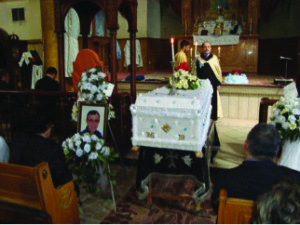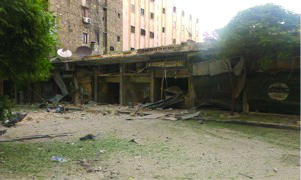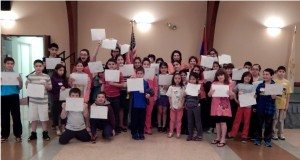In a Dec. 17, 2013 judgment on the case of Perincek vs. Switzerland, the European Court of Human Rights (ECHR) denounced the conviction of Turkish nationalist Dogu Perincek by the Swiss courts.
In 2005, during several events in Switzerland, Perincek had described the genocide of the Armenians as an “international lie,” thereby violating Swiss anti-racism legislation (Article 261 of the Swiss Penal Code). However, the ECHR viewed the remarks as protected by the fundamental right to freedom of expression, which it deemed was breached by the judgment of the Swiss courts. It would appear that the goal associated with this specific expression of opinion and the political context in which it occurred played no role.
Immanuel Kant once pointed out that “opinion is a consciously insufficient judgment.” And thus the following question begs to be asked: What is the political agenda behind a consciously “insufficient judgment” of false historical factual assertions in the case of human rights and international law violations?
One of the most important insights that came from the Holocaust was that for the effective protection of human rights and the prevention of collective violence and genocide (apart from the punishment of severe human rights violations and crimes against humanity), the denial of these crimes must also be sanctioned. This consensus has constituted one of the central pillars of tolerance and democracy, and served as the blueprint for lasting peace in Europe following 1945.
In this context, namely the sanctioning of genocide denial on the one hand and the protection of the fundamental right to freedom of expression on the other, it is helpful to remind ourselves of the legal foundations of the punishability of “Auschwitz denial” (Penal Code §130, section 3) in the Federal Republic of Germany. With regard to “Auschwitz denial,” the Federal Constitutional Court examined the question of breaching the fundamental right to freedom of expression. In this respect, a fundamental distinction was made between opinions and factual assertions, with the latter being protected only if they serve as the foundation for forming opinion. But according to the Federal Constitutional Court, a democracy has, in principle, no interest in protecting untrue factual assertions, as these make no positive contributions to forming societal opinions. For this reason, the Federal Constitutional Court did not deem the protected space of freedom of expression to be breached in the case of Holocaust denial. According to this jurisdiction, which has existed for decades, such false remarks therefore do not constitute an opinion in the sense of basic constitutional law. The fundamental right to freedom of expression is therefore not even pertinent (BVerfGE 90, 241 from April 13, 1994).
This view confirms the judgment of the ECHR insofar as it also does not view the denial of the Holocaust as protected by the fundamental right to freedom of expression, as the crimes of the National Socialists against the European Jews have been historically established and decreed by a court, the Nuremburg war crimes tribunal.
The denial of the genocide of the Armenians can be seen in a comparable sense as a false factual assertion, which should likewise not be protected by the fundamental right to freedom of expression.
Indeed, the crimes against the Armenians are not only historically documented but were, as in the case of the Holocaust, established by the 1919 conviction of the initiators, the persons responsible, and the main perpetrators. The trials were conducted by a special war court, which was set up on the basis of a note from the Allied governments in May 1915; the charge was “crimes against humanity and against civilization.”
In both cases, the main perpetrators were not on trial for the criminal offence of “genocide,” as this term did not yet exist as a category of international law, but for the criminal offence of “crimes against humanity,” from which the legal category of “genocide” was later derived. These two genocides, the genocide of the Armenians and the Holocaust, thus prompted the establishment of the category of “genocide” in international law. The Armenian Genocide led the international law expert Raphael Lemkin to call for the establishment and stimulation of such a category in international law; the Holocaust led to this being implemented in 1948 with the UN Genocide Convention.
Beyond this formal-legal and legal-historical context, it can be established that the denial of the genocide of the Armenians is fundamentally a political strategy of Turkey, and Dogu Perincek is one of the most important and provocative exponents of this strategy. For instance, he was a central protagonist of the Talat Pasha movement, which was named after one of the main persons responsible for the extermination of the Armenians. Among other things, in 2006, the movement aimed to protest against the “genocide lie” with a “march in Berlin.” In a judgment on March 17, 2006, the Higher Administrative Court of Berlin permitted the event, but under the condition that the Armenian Genocide not be described as a lie, either in speech or in verbal or written contributions, as this would fulfill the objective facts of denigrating the remembrance of the deceased, according to §189 StGB.
The lack of an international consensus in terms of acknowledging the genocide, which is addressed in the justification of the judgment of the ECHR, is not based on an insufficient historical documentation of events or on an inadequately justified qualification of the event by historical research. Rather, it is based precisely on this policy of denial by Turkey, which has been flanked by massive threats of economic and political sanctions for almost 100 years. The powerful effectiveness of this vehement state policy of denial is shown, for instance, in the fact that the president of the United States of America, Barack Obama, avoids the term “genocide” with regard to the Armenian Genocide, and instead uses the Armenian term for genocide, “yeghern,” a term that has been used by the Armenian community since the 1920’s, and which is equivalent to the Hebrew term “shoah.” The fact that thus far, only 20 nation-states have withstood the immense pressure exerted by Turkey on the community of states, and have acknowledged the genocide of the Armenians as such, does not reflect a lack of consensus. Rather, it is the result of a problematic prevention of expressing historical facts due to economic and alliance-political considerations between the states.
The agenda of Turkish denial, which in view of the upcoming 100th anniversary of the genocide is taking on a new quality of state-institutional organization, by no means consists solely in the negation of dark remembrance. The denial is a political strategy and the basis of a policy: It is an integral element in the process of forming a national Turkish identity. In this context, the suppression of the analysis of one’s own history by Turkish “state opinion” enables a repressive policy on minorities, a disregard of human rights, and an acceleration of racist prejudices in Turkey, where the word “Armenian” is still used as a defamatory swear word.
If the ECHR now places Perincek’s claim that the genocide of the Armenians is an “international lie” under the protection of the human right to freedom of expression, this has far-reaching consequences. For, on the one hand, the qualification of the opposite standpoint as a “lie” means depriving it of its status as an expression of opinion and defaming it as a deliberately false factual assertion. On the other hand, the protection of this defamation by the fundamental right to freedom of expression ultimately applies not only to individual expression but also to the system of political denial in which this expression is made. It is not without reason that following the announcement of the verdict, Turkish newspapers reported that although it was Perinçek, the now heralded kahraman (hero), who had enforced his rights before the ECHR, the verdict also meant a victory for Turkey—and its politics of history and identity, as well as its national politics.
Therefore, when comparing the protection against the denial of genocide crimes with the right to freedom of expression, we must ask how we can defend ourselves against ways of using this freedom in order, through consciously insufficient judgment, to endanger or deny basic European values—and the political-strategic denial of the most severe crimes and the denigration of their victims is an undeniable part of this. Therefore, in its considerations regarding the Holocaust, as mentioned, the German Federal Constitutional Court did not deem the protected space of the freedom of expression as being breached.
But even if one had seen such expressions as opinions, thus deeming the protected space of freedom of expression to be breached, the question of the justification of such an encroachment still arises. In this respect, a balancing of interests should be taken. In terms of the punishability of genocide denial, the weight of the apparently affected fundamental right should be weighed against the fundamentally violated, perhaps even dissolved personal right of the victims. Here, too, a look at the German legislation on the punishability of Auschwitz denial can be illuminating: The core of the legislations is the protection of victims against derision, protection against the disparagement of the memory of the deceased, and protection of descendants against defamation (§189 StGB).
The decision to criminalize the denial of a genocide is not a guideline to determine history; rather, it opens up a legal space to enable the protection of historical knowledge about the facts of the genocide and the remembrance of the victims. Against the backdrop of the strategic policy of denial by Turkish “state opinion” and its agents, it would be desirable to specifically protect the remembrance of the victims of the Armenian Genocide by the Young Turks against false factual assertions.
Switzerland, which is exemplary in this respect regarding its legislation and its legal practice, is called upon not to follow the judgment of the Small Chamber of the Strasbourg Court, but to take it to the Grand Chamber of the ECHR.
As there is a danger here of undermining a fundamental principle established following the experience of the Holocaust, an urgent task of international politics and, particularly, its legal bodies is to fulfill this responsibility for protection.
Prof. Dr. Mihran Dabag is the director of the Institut für Diaspora und Genozidforschung/Ruhr-Universität Bochum.
The post Perincek vs. Switzerland: Freedom of Expression Distorted appeared first on Armenian Weekly.
























